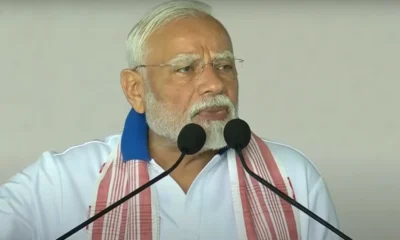[vc_row][vc_column][vc_column_text]The Union Cabinet on Wednesday approved a substantial hike in the Minimum Support Price (MSP) for Kharif crops, which was proposed in the Budget 2018 by Finance Minister Arun Jaitley.
The decision, taken by the Union Cabinet headed by Prime Minister Narendra Modi, comes less than a year before next general election. In the Budget 2018, the government proposed to hike MSP of crops to one-and-half times of the procurement cost.
A government release said the Minimum Support Prices (MSPs) for all kharif crops of 2018-19 season have been increased as follows:
(Rs/quintal)
| Commodity
|
Variety
|
MSP for 2017-18 Season
|
MSP approved for 2018-19 Season
|
Increase
|
Return*over cost in percent
|
| Absolute
Absolute
|
Percentage
|
| Paddy
|
Common
|
1550
|
1750
|
200
|
12.90
|
50.09
|
| Grade A
Grade A
|
1590
|
1770
|
180
|
11.32
|
51.80
|
| Jowar
|
Hybrid
|
1700
|
2430
|
730
|
42.94
|
50.09
|
| Maldandi
Maldandi
|
1725
|
2450
|
725
|
42.03
|
51.33
|
| Bajra
|
–
|
1425
|
1950
|
525
|
36.84
|
96.97
|
| Ragi
|
–
|
1900
|
2897
|
997
|
52.47
|
50.01
|
| Maize
|
–
|
1425
|
1700
|
275
|
19.30
|
50.31
|
| Arhar(Tur)
|
–
|
5450
|
5675
|
225
|
4.13
|
65.36
|
| Moong
|
–
|
5575
|
6975
|
1400
|
25.11
|
50.00
|
| Urad
|
–
|
5400
|
5600
|
200
|
3.70
|
62.89
|
| Groundnut
|
–
|
4450
|
4890
|
440
|
9.89
|
50.00
|
| Sunflower Seed
|
–
|
4100
|
5388
|
1288
|
31.42
|
50.01
|
| Soyabean
|
–
|
3050
|
3399
|
349
|
11.44
|
50.01
|
| Sesamum
|
–
|
5300
|
6249
|
949
|
17.91
|
50.01
|
| Nigerseed
|
–
|
4050
|
5877
|
1827
|
45.11
|
50.01
|
| Cotton
|
Medium Staple
|
4020
|
5150
|
1130
|
28.11
|
50.01
|
| Long Staple
|
4320
|
5450
|
1130
|
26.16
|
58.75
|
* Includes all paid out costs such as those incurred on account of hired human labour, bullock labour/machine labour, rent paid for leased in land, expenses incurred on use of material inputs like seeds, fertilizers, manures, irrigation charges, Depreciation on implements and farm miscellaneous expenses, and imputed value of family labour.
Briefly, the MSP for paddy has been raised by around Rs 250 per quintal.
The MSP hike will cost the state nearly Rs. 15,000 crore in public funds, said NDTV.
The minimum support price for paddy has been hiked by 1.5 times and the rest by approximately 50 per cent.
The MSP of paddy (common grade) has been increased by Rs 200 to Rs 1,750 per quintal, while that of Grade A variety by Rs 160 per quintal to Rs 1,750.
The MSP of paddy (common) was Rs 1,550 per quintal and Rs 1,590 per quintal for paddy (grade A) variety.
The MSP of cotton (medium staple) has been increased to Rs 5,150 from Rs 4,020 and that of cotton (long staple) to Rs 5,450 from 4,320 per quintal.
In pulses, tur MSP has been raised to Rs 5,675 per quintal from Rs 5,450,
of moong to Rs 6,975 per quintal from Rs 5,575.
Urad MSP has been hiked to Rs 5,600 from Rs 5,400 per quintal.
Hike in paddy MSP will increase the food subsidy bill by over Rs 11,000 crore based on procurement figure of the 2016-17 marketing year (October-September), said media reports.
However, the key question remains how the increase in MSP is implemented as the government’s procurement mechanism has been known to be weak and only 6% of all farmers actually get the MSP.
The decision, taken by the Union Cabinet headed by Prime Minister Narendra Modi, comes less than a year before next general elections and ahead of the assembly elections in three BJP-ruled states – Rajasthan, Madhya Pradesh and Chhattisgarh – where farmers, already restive, form a chunk of the population
Calling it a “historic decision” by the NDA government, Home Minister Rajnath Singh said, “Farmers are the largest producer, consumer and customer in this country but they never got the price they deserved for their produce. Modi ji understood this and now farmers will get 1.5 times more MSP on their produce.”
PM Modi tweeted:[/vc_column_text][vc_raw_html]JTNDYmxvY2txdW90ZSUyMGNsYXNzJTNEJTIydHdpdHRlci10d2VldCUyMiUyMGRhdGEtbGFuZyUzRCUyMmVuJTIyJTNFJTNDcCUyMGxhbmclM0QlMjJoaSUyMiUyMGRpciUzRCUyMmx0ciUyMiUzRSVFMCVBNCVBRSVFMCVBNSU4MSVFMCVBNCU5RCVFMCVBNSU4NyUyMCVFMCVBNCU4NSVFMCVBNCVBNCVFMCVBNSU4RCVFMCVBNCVBRiVFMCVBNCU4MiVFMCVBNCVBNCUyMCVFMCVBNCU5NiVFMCVBNSU4MSVFMCVBNCVCNiVFMCVBNSU4MCUyMCVFMCVBNCVCOSVFMCVBNSU4QiUyMCVFMCVBNCVCMCVFMCVBNCVCOSVFMCVBNSU4MCUyMCVFMCVBNCVCOSVFMCVBNSU4OCUyMCVFMCVBNCU5NSVFMCVBNCVCRiUyMCVFMCVBNCU5NSVFMCVBNCVCRiVFMCVBNCVCOCVFMCVBNCVCRSVFMCVBNCVBOCUyMCVFMCVBNCVBRCVFMCVBNCVCRSVFMCVBNCU4NyVFMCVBNCVBRiVFMCVBNSU4QiVFMCVBNCU4Mi0lRTAlQTQlQUMlRTAlQTQlQjklRTAlQTQlQTglRTAlQTUlOEIlRTAlQTQlODIlMjAlRTAlQTQlOTUlRTAlQTUlOEIlMjAlRTAlQTQlQjglRTAlQTQlQjAlRTAlQTQlOTUlRTAlQTQlQkUlRTAlQTQlQjAlMjAlRTAlQTQlQTglRTAlQTUlODclMjAlRTAlQTQlQjIlRTAlQTQlQkUlRTAlQTQlOTclRTAlQTQlQTQlMjAlRTAlQTQlOTUlRTAlQTUlODclMjAxLjUlMjAlRTAlQTQlOTclRTAlQTUlODElRTAlQTQlQTglRTAlQTQlQkUlMjBNU1AlMjAlRTAlQTQlQTYlRTAlQTUlODclRTAlQTQlQTglRTAlQTUlODclMjAlRTAlQTQlOTUlRTAlQTQlQkUlMjAlRTAlQTQlOUMlRTAlQTUlOEIlMjAlRTAlQTQlQjUlRTAlQTQlQkUlRTAlQTQlQTYlRTAlQTQlQkUlMjAlRTAlQTQlOTUlRTAlQTQlQkYlRTAlQTQlQUYlRTAlQTQlQkUlMjAlRTAlQTQlQTUlRTAlQTQlQkUlMkMlMjAlRTAlQTQlODYlRTAlQTQlOUMlMjAlRTAlQTQlODklRTAlQTQlQjglRTAlQTUlODclMjAlRTAlQTQlQUElRTAlQTUlODIlRTAlQTQlQjAlRTAlQTQlQkUlMjAlRTAlQTQlOTUlRTAlQTQlQkYlRTAlQTQlQUYlRTAlQTQlQkUlMjAlRTAlQTQlOTclRTAlQTQlQUYlRTAlQTQlQkUlMjAlRTAlQTQlQjklRTAlQTUlODglRTAlQTUlQTQlMjAlRTAlQTQlQUIlRTAlQTQlQjglRTAlQTQlQjIlRTAlQTUlOEIlRTAlQTQlODIlMjAlRTAlQTQlOTUlRTAlQTUlODclMjAlRTAlQTQlQTglRTAlQTUlOEQlRTAlQTQlQUYlRTAlQTUlODIlRTAlQTQlQTglRTAlQTQlQTQlRTAlQTQlQUUlMjAlRTAlQTQlQjglRTAlQTQlQUUlRTAlQTQlQjAlRTAlQTUlOEQlRTAlQTQlQTUlRTAlQTQlQTglMjAlRTAlQTQlQUUlRTAlQTUlODIlRTAlQTQlQjIlRTAlQTUlOEQlRTAlQTQlQUYlMjAlRTAlQTQlQUUlRTAlQTUlODclRTAlQTQlODIlMjAlRTAlQTQlODclRTAlQTQlQjglMjAlRTAlQTQlQUMlRTAlQTQlQkUlRTAlQTQlQjAlMjAlRTAlQTQlOTAlRTAlQTQlQTQlRTAlQTQlQkYlRTAlQTQlQjklRTAlQTQlQkUlRTAlQTQlQjglRTAlQTQlQkYlRTAlQTQlOTUlMjAlRTAlQTQlQjUlRTAlQTUlODMlRTAlQTQlQTYlRTAlQTUlOEQlRTAlQTQlQTclRTAlQTQlQkYlMjAlRTAlQTQlOTUlRTAlQTUlODAlMjAlRTAlQTQlOTclRTAlQTQlODglMjAlRTAlQTQlQjklRTAlQTUlODglRTAlQTUlQTQlMjAlRTAlQTQlQjglRTAlQTQlQUQlRTAlQTUlODAlMjAlRTAlQTQlOTUlRTAlQTQlQkYlRTAlQTQlQjglRTAlQTQlQkUlRTAlQTQlQTglMjAlRTAlQTQlQUQlRTAlQTQlQkUlRTAlQTQlODclRTAlQTQlQUYlRTAlQTUlOEIlRTAlQTQlODItJUUwJUE0JUFDJUUwJUE0JUI5JUUwJUE0JUE4JUUwJUE1JThCJUUwJUE0JTgyJTIwJUUwJUE0JTk1JUUwJUE1JThCJTIwJUUwJUE0JUFDJUUwJUE0JUE3JUUwJUE0JUJFJUUwJUE0JTg4JUUwJUE1JUE0JTNDJTJGcCUzRSUyNm1kYXNoJTNCJTIwTmFyZW5kcmElMjBNb2RpJTIwJTI4JTQwbmFyZW5kcmFtb2RpJTI5JTIwJTNDYSUyMGhyZWYlM0QlMjJodHRwcyUzQSUyRiUyRnR3aXR0ZXIuY29tJTJGbmFyZW5kcmFtb2RpJTJGc3RhdHVzJTJGMTAxNDQzNTgwNjcwMDg2NzU4NSUzRnJlZl9zcmMlM0R0d3NyYyUyNTVFdGZ3JTIyJTNFSnVseSUyMDQlMkMlMjAyMDE4JTNDJTJGYSUzRSUzQyUyRmJsb2NrcXVvdGUlM0UlMEElM0NzY3JpcHQlMjBhc3luYyUyMHNyYyUzRCUyMmh0dHBzJTNBJTJGJTJGcGxhdGZvcm0udHdpdHRlci5jb20lMkZ3aWRnZXRzLmpzJTIyJTIwY2hhcnNldCUzRCUyMnV0Zi04JTIyJTNFJTNDJTJGc2NyaXB0JTNFJTBB[/vc_raw_html][vc_column_text]The delay in implementation of a big hike in support prices, which was one of the pre-election promises of the BJP had exposed the government to regular attacks by farmer associations and the opposition for making “hollow promises” about doubling their income by 2022.
Congress President Rahul Gandhi had accused the prime minister of “finishing the farmer”. He said, “The government has to help the farmer. How will that happen? Through MSP and loan waivers. In the absence of such measures, small farmers are unable to make any money.”
Last year saw massive protests by farmer associations across the country over MSP and loan waivers. It started last summer in Madhya Pradesh, where six farmers were killed in police firing, and spread to other states where farmers destroyed fresh produce in symbolic protest. In March, it took shape of the colossal Kisan Long March in Maharashtra, in which around 50,000 farmers walked 180 km from Nasik to Mumbai.
Last month, farmers across the country held a 10-day “Gaon Bandh”, during which thousands refused to send supply of fruits, vegetables and dairy products to cities.
The farm distress – caused by falling agricultural income and aggravated by blow to animal husbandry due to cattle trade ban and cow vigilantism – has triggered huge protests by farmers in many parts of the country. They also had the support of the opposition, which has highlighted farmers’ suicides to accuse the government of being insensitive to farmers’ demands.[/vc_column_text][/vc_column][/vc_row]


 Latest world news17 hours ago
Latest world news17 hours ago
 India News18 hours ago
India News18 hours ago
 Latest world news3 hours ago
Latest world news3 hours ago
 India News3 hours ago
India News3 hours ago
 India News2 hours ago
India News2 hours ago
 India News2 hours ago
India News2 hours ago
 LATEST SPORTS NEWS2 hours ago
LATEST SPORTS NEWS2 hours ago











